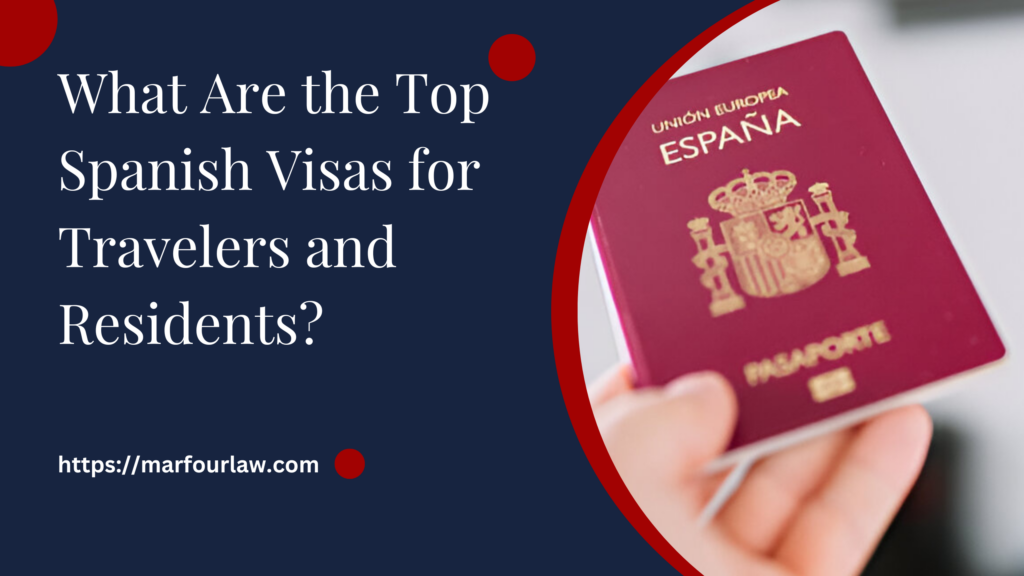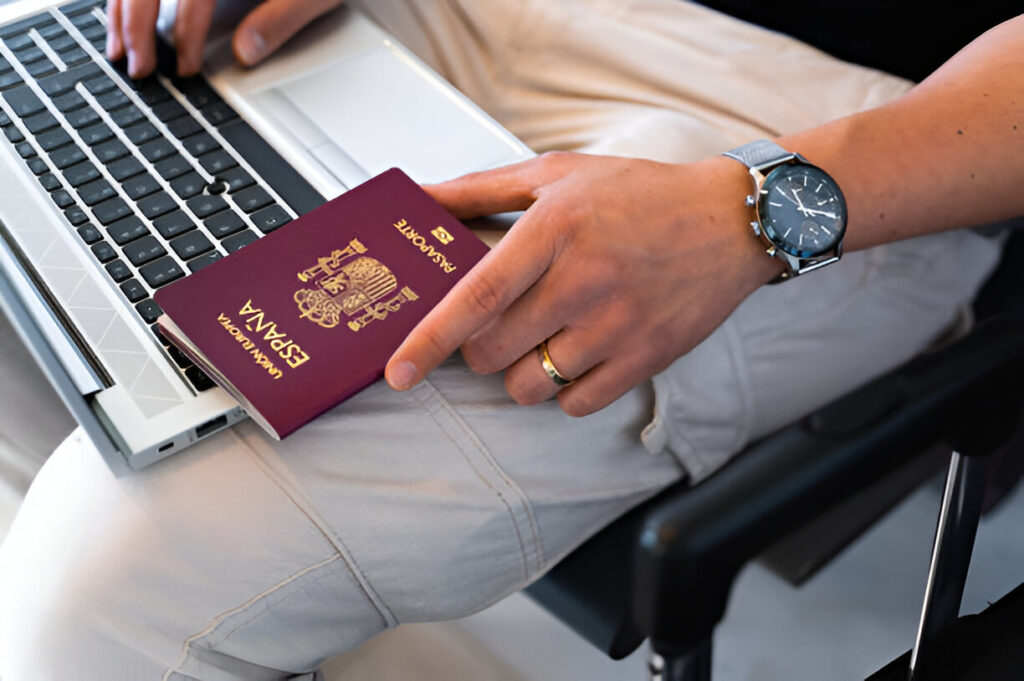What Are the Top Spanish Visas for Travelers and Residents?

The Top Spanish Visas: Planning a move or extended stay in Spain requires a clear understanding of the available visa options. Spain offers a range of visas designed to accommodate various needs, whether you’re interested in working, studying, investing, or retiring in this vibrant country. This comprehensive guide explores the top Spanish visas, providing detailed information about each type, including eligibility criteria, required documents, application processes, and tips for a successful application.
What Are the Top Spanish Visas? What You Need To Know?
Spain’s visa system is designed to cater to diverse purposes and personal circumstances. From long-term stays to temporary work opportunities, Spain provides a variety of visas suited to different needs. Here’s an in-depth look at the most popular Spanish visas.
What is the Long-Term Stay Visa?
The Long-Term Stay Visa is intended for non-EU nationals who wish to live in Spain for more than 90 days without engaging in any professional or gainful activities. It’s particularly popular among retirees, digital nomads, and individuals who want to enjoy Spain’s lifestyle without being tied to a job. The visa allows you to reside in Spain, renew your permit annually, and eventually apply for permanent residency if you meet the conditions.
Eligibility Criteria
To be eligible for the Long-Term Stay Visa, you must meet the following criteria:
-
- Financial Means: You must demonstrate that you have sufficient financial resources to support yourself during your stay in Spain. This is to ensure that you can live in Spain without relying on employment or public assistance. The required amount varies but generally involves proving you have a steady income or substantial savings.
-
- Health Insurance: You need to have comprehensive health insurance that covers all medical expenses in Spain. The insurance must be valid for the entire duration of your stay and should include coverage for repatriation.
-
- Clean Criminal Record: A police clearance certificate or criminal background check from your home country is required to show that you do not have a criminal record.
-
- Medical Certificate: You may need to provide a medical certificate confirming that you do not have any diseases that could pose a public health risk.
Required Documents
When applying for the Long-Term Stay Visa, you will need to gather several important documents:
-
- Proof of Financial Means: Bank statements showing a consistent balance that meets the required threshold. Pension statements if you are a retiree. Investment portfolios or proof of other income sources like rental income or dividends.
-
- Health Insurance Policy: A policy from a Spanish insurance company or an international policy that provides coverage in Spain. The policy should include full medical coverage without co-payments and cover repatriation in case of serious illness or death.
-
- Criminal Background Check: A police clearance certificate from your home country or any country where you have resided in the last five years. This document may need to be apostilled or legalized, depending on your country of origin.
-
- Medical Certificate: A certificate issued by a doctor stating that you do not suffer from any disease that could have serious public health consequences. The certificate should be issued within the last three months.
Application Process
The application process for the Long-Term Stay Visa involves several steps:
-
- Gather Required Documents: Start by collecting all the necessary documents, including proof of financial means, health insurance, background checks, and medical certificates. Make sure all documents are current and meet the requirements set by the Spanish consulate.
-
- Submit Application: Submit your application at the Spanish consulate or embassy in your home country. You will need to fill out the visa application form and submit it along with your documents. Some consulates may require that you make an appointment in advance.
-
- Attend an Interview: Depending on the consulate, you might be asked to attend an interview. During this interview, you may be asked about your plans in Spain, your financial situation, and your reasons for wanting to live in Spain.
-
- Visa Approval: Once your application is reviewed and approved, you will be issued a visa. This visa will allow you to enter Spain, where you will then need to apply for a residence permit (Tarjeta de Identidad de Extranjero – TIE) within 30 days of arrival.
Additional Information
The Long-Term Stay Visa is a perfect option for those who want to experience the Spanish lifestyle without working. Here are a few key benefits:
-
- Lifestyle: This visa gives you the chance to immerse yourself in the Spanish culture, enjoy the Mediterranean climate, and explore Spain’s beautiful regions. Whether you’re interested in the vibrant city life of Madrid and Barcelona or the tranquil countryside, Spain offers something for everyone.
-
- Healthcare: Spain has an excellent healthcare system, and with comprehensive health insurance, you can access top-quality medical care during your stay.
-
- Renewal and Residency: The visa can be renewed annually, and after five years of continuous residency, you may apply for permanent residency. This provides a pathway to long-term living in Spain without the need to return to your home country.
-
- Family: You can include your family members in your application, allowing them to join you in Spain under the same visa conditions.
This visa is an excellent opportunity for those who wish to enjoy Spain’s rich cultural heritage, warm climate, and high quality of life without the pressures of employment.
What is the Student Visa?
The Student Visa allows non-EU nationals to live and study in Spain for the duration of their academic program. This visa is ideal for students enrolling in universities, language schools, or other accredited educational institutions in Spain. It grants permission to reside in Spain legally and, in some cases, allows students to work part-time during their studies.

Eligibility Criteria
To be eligible for the Student Visa, you must meet the following criteria:
-
- Enrollment in a Recognized Institution: You must be accepted into a recognized educational institution in Spain. This could be a university, language school, or any other program that the Spanish government accredits. The course must be full-time and last more than 90 days.
-
- Proof of Financial Support: You must demonstrate that you have sufficient financial resources to cover your living expenses and tuition fees during your stay in Spain. This is to ensure that you can support yourself without needing to work full-time.
-
- Health Insurance: Comprehensive health insurance coverage is required for the entire duration of your stay. This insurance must cover all medical expenses, including emergencies and repatriation.
-
- Clean Criminal Record: A police clearance certificate from your home country may be required to show that you have no criminal history.
Required Documents
When applying for a Student Visa, you will need to provide several key documents:
-
- Acceptance Letter: You must submit an official acceptance letter from the Spanish educational institution where you will be studying. This letter should confirm your enrollment in a full-time program and specify the course details, duration, and start date.
-
- Proof of Financial Support: Bank statements showing a sufficient balance to cover your living expenses and tuition fees. Proof of scholarships, if applicable, or a financial guarantee from parents or guardians. The required amount varies depending on the location and length of stay, but generally, you should prove you have at least €600-700 per month for living expenses.
-
- Health Insurance Policy: A policy from a Spanish or international insurer that covers all medical costs in Spain. The insurance must be valid for the entire duration of your stay and should include repatriation coverage.
-
- Criminal Background Check: A police clearance certificate from your home country, if required, confirming you do not have a criminal record. This document may need to be apostilled or legalized, depending on your country of origin.
-
- Medical Certificate: A medical certificate may be required to confirm you do not have any diseases that could pose a public health risk.
Application Process
The process of applying for a Student Visa involves several steps:
-
- Obtain an Acceptance Letter: Secure your place at a recognized educational institution in Spain. Ensure that you receive an official acceptance letter, as this is a crucial document for your visa application.
-
- Gather Required Documents: Collect all necessary documents, including the acceptance letter, proof of financial support, health insurance, and any other required documents. Make sure all documents meet the specific requirements set by the Spanish consulate.
-
- Submit Application: Apply for the Student Visa at the Spanish consulate or embassy in your home country. You will need to fill out a visa application form and submit it along with your supporting documents. Some consulates may require that you schedule an appointment in advance.
-
- Attend an Interview: Depending on the consulate, you may be required to attend an interview. During the interview, you may be asked about your study plans, financial situation, and reasons for choosing Spain.
-
- Receive Visa Approval: After your application is processed and approved, you will receive your visa. With the visa in hand, you can travel to Spain and begin your studies. Once in Spain, you may need to apply for a student residence card (Tarjeta de Identidad de Extranjero – TIE) within 30 days of your arrival.
Additional Information
The Student Visa offers numerous benefits beyond just studying:
-
- High-Quality Education: Spain is home to some of Europe’s most prestigious universities and institutions, offering a wide range of academic programs in both English and Spanish. The quality of education is high, and many institutions have strong international reputations.
-
- Vibrant Student Life: Spain is known for its lively student life, with cities like Barcelona, Madrid, Valencia, and Granada offering a mix of academic excellence and cultural experiences. Students can participate in various extracurricular activities, from sports and arts to student organizations and events.
-
- Cultural and Social Experience: Studying in Spain offers an immersive cultural experience. You can explore Spain’s rich history, visit world-renowned museums, enjoy the local cuisine, and participate in traditional festivals. Learning Spanish, a globally spoken language, is an added advantage that can open doors to new opportunities.
-
- Travel Opportunities: Spain’s strategic location makes it easy to travel across Europe. Students often take advantage of their time in Spain to visit neighboring countries like France, Portugal, and Italy during their breaks.
-
- Work Opportunities: While the Student Visa is primarily for studying, it often allows students to work part-time during their course. This can help cover living expenses and provide valuable work experience.
The Student Visa is an excellent choice for international students looking to pursue their education in Spain. It provides a pathway to experience Spain’s academic excellence, vibrant culture, and diverse social environment. With the right preparation and documentation, you can secure your visa and embark on an enriching educational journey in one of Europe’s most exciting countries.
Spain Visa Types for Work and Business
Spain offers several types of visas tailored for professionals and entrepreneurs. These visas are specifically designed to meet the needs of individuals who wish to work or conduct business in Spain, providing a legal pathway to live and contribute to the Spanish economy.
Work Visa
The Work Visa is a common option for non-EU nationals who have secured employment in Spain. This visa allows individuals to live and work in Spain legally, providing them with the opportunity to gain international work experience and immerse themselves in Spanish culture. The Work Visa is essential for those looking to relocate to Spain for employment purposes.
Eligibility Criteria
To be eligible for a Work Visa, an individual must meet specific requirements. The primary requirement is having a confirmed job offer from a Spanish employer. The employer must also demonstrate that the job position cannot be filled by a local (EU) candidate, which involves proving that the role is unique or that there is a shortage of qualified professionals in Spain. Additionally, applicants need to have the necessary qualifications and professional experience relevant to the job they will be performing in Spain.
Documents Required
When applying for a Work Visa, several critical documents are needed to support the application. These include:
-
- Employment Contract: A formal job offer from a Spanish employer outlining the role, salary, and employment terms.
-
- Proof of Qualifications: Academic degrees, professional certificates, and work experience documentation that validate the applicant’s expertise and suitability for the job.
-
- Health Insurance: Proof of comprehensive health insurance coverage that includes medical expenses and repatriation.
-
- Criminal Background Check: A police clearance certificate from the applicant’s home country to ensure they have no criminal record.
-
- Medical Certificate: A document confirming the applicant’s good health and absence of contagious diseases.
Application Process
The application process for a Work Visa involves several steps. First, the individual must secure a job offer from a Spanish employer. The employer then initiates the visa process by submitting the necessary documentation to the Spanish immigration authorities, which includes demonstrating that no local candidates are available for the role. After this, the applicant gathers their documents and submits their visa application at the Spanish consulate or embassy in their home country. In some cases, an interview may be required. Once the application is approved, the individual receives their Work Visa, allowing them to travel to Spain and commence employment. Upon arrival, they must also apply for a residence permit within 30 days to formalize their stay.
Additional Information
Working in Spain offers numerous benefits beyond just employment. It provides an excellent opportunity to learn the Spanish language, which is one of the most spoken languages worldwide. Additionally, Spain’s job market is diverse, with significant opportunities in sectors such as technology, finance, education, and hospitality. Cities like Madrid and Barcelona are major hubs for international business, offering a vibrant work environment.
Spain’s strong labor laws ensure that employees enjoy fair working conditions, including regulated working hours, paid leave, and social security benefits. This makes Spain an attractive destination for professionals seeking a balanced work-life experience in a culturally rich and dynamic country.
Entrepreneur Visa: Paving the Way for Business Innovators in Spain
The Entrepreneur Visa is designed for individuals aspiring to establish a business in Spain, contributing to the nation’s economic growth and fostering innovation. This visa provides a streamlined pathway for entrepreneurs, facilitating their entry and establishment within Spain’s dynamic business environment.

Eligibility Criteria for the Entrepreneur Visa
To qualify for the Entrepreneur Visa, applicants must meet specific criteria that demonstrate their capability and commitment to fostering economic benefits in Spain. These include:
Viable Business Plan:
-
- Detailed Proposal: The applicant must present a comprehensive business plan that outlines the proposed business idea. The plan should include a detailed market analysis, target audience, marketing strategies, operational plans, and financial projections.
-
- Economic Benefit: The business plan must clearly illustrate how the venture will contribute positively to Spain’s economy. This can include job creation, technological advancement, or fulfilling a market gap.
Approval by Spanish Authorities:
-
- Business Evaluation: The business plan must be submitted to and approved by the Spanish government. Authorities will assess the feasibility, innovation, and economic impact of the proposed business.
Proof of Financial Resources:
-
- Funding Evidence: Applicants must provide evidence of sufficient financial resources to support both the business venture and their living expenses in Spain. This can include bank statements, investment portfolios, or financial support letters.
Documents Required for the Entrepreneur Visa
Applicants must prepare and submit several essential documents to support their visa application. These include:
-
- Business Plan: A detailed business plan outlining the business idea, market analysis, competitive landscape, operational strategy, and financial projections.
-
- Approval Proof: Documentation of the business plan’s approval by Spanish authorities.
-
- Financial Resources: Bank statements, investment portfolios, or other financial documents demonstrating sufficient funds to support the business venture and personal living expenses.
-
- Health Insurance: Proof of comprehensive health insurance that covers medical expenses and repatriation.
Application Process for the Entrepreneur Visa
The application process for the Entrepreneur Visa involves several steps to ensure thorough preparation and compliance with Spanish immigration regulations:
-
- Create a Detailed Plan: Develop a comprehensive business plan that meets the criteria set by Spanish authorities. This plan should cover all aspects of the business, from concept to financial viability.
-
- Obtain Approval: Submit the business plan to Spanish authorities for approval. Ensure it demonstrates significant economic benefits and feasibility
-
- Financial Documentation: Collect proof of financial resources to support the business and personal expenses.
-
- Health Insurance: Obtain comprehensive health insurance coverage.
-
- Approval Documentation: Ensure you have the approved business plan.
-
- Consulate Submission: Apply for the Entrepreneur Visa at the Spanish consulate or embassy in your home country. Ensure all required documents are included in your application.
-
- Consulate Interview: Some consulates may require an interview as part of the application process. Be prepared to discuss your business plan and demonstrate your commitment to the venture.
-
- Visa Issuance: Once your application is approved, you will receive the Entrepreneur Visa. You can then travel to Spain and commence your business activities.
Additional Information on the Entrepreneur Visa
The Entrepreneur Visa is a powerful tool for fostering foreign investment and entrepreneurial activity in Spain. It provides numerous advantages and opportunities for aspiring business owners, Spain offers various incentives, grants, and resources to support new businesses. These include tax breaks, financial support programs, and access to business networks.
Spain’s strategic location within Europe provides excellent access to both European and global markets. This makes it an ideal hub for business expansion and operations. Spain boasts a robust infrastructure that supports business growth. This includes advanced transportation networks, reliable communication systems, and a skilled workforce. Numerous business incubators and accelerators in Spain provide valuable support to startups. These entities offer mentorship, networking opportunities, and funding to help new businesses thrive.
Working Holiday Visa Spain: Combining Travel and Work in Spain
The Working Holiday Visa allows young individuals to travel and work in Spain, providing an exciting opportunity to experience Spanish culture while gaining work experience. This visa is particularly popular among those seeking a gap year or a temporary change of scenery.

Eligibility Criteria for the Working Holiday Visa
To qualify for the Working Holiday Visa in Spain, applicants must meet specific requirements. These include:
-
- Age Limits: Applicants must generally be between 18 and 30 years old. Some agreements may extend the age limit to 35 years, depending on the applicant’s home country.
-
- Eligible Countries: The Working Holiday Visa is available to citizens of countries with which Spain has a bilateral agreement. This includes countries like Australia, New Zealand, Canada, Japan, South Korea, and others. Eligibility may vary, so it’s essential to check specific agreements.
-
- Travel and Work: The primary purpose of the visa is to allow individuals to travel and work in Spain. The visa should be used for short-term employment and not for long-term or permanent job placements.
-
- Proof of Funds: Applicants must demonstrate they have sufficient financial resources to support themselves during their stay. This ensures they can cover initial expenses and any unforeseen costs.
-
- Coverage Requirement: Comprehensive health insurance is mandatory for the duration of the stay. This insurance should cover medical expenses and repatriation.
Documents Required for the Working Holiday Visa
To apply for the Working Holiday Visa, you will need to prepare several important documents:
Completed Application Form:
Fill out the visa application form accurately and completely. Forms are usually available on the Spanish consulate or embassy website.
-
- Passport Requirements: Your passport must be valid for at least six months beyond the planned date of entry into Spain.
-
- Photograph Specifications: Provide passport-sized photographs that meet the consulate’s requirements.
-
- Financial Evidence: Submit bank statements or other documentation demonstrating you have sufficient funds for your stay.
-
- Insurance Policy: Provide proof of comprehensive health insurance coverage for the entire duration of your stay.
-
- Return Ticket: Show evidence of a return ticket or sufficient funds to purchase one. This ensures you can return to your home country at the end of your visa period.
-
- Personal Statement: Write a cover letter explaining your plans for your stay in Spain, including your travel and work intentions.
Application Process for the Working Holiday Visa
The application process for a Working Holiday Visa in Spain involves several steps. First, applicants must ensure they meet the eligibility criteria, including being within the age range typically required (usually 18-30 or 35) and holding a passport from a country that has a working holiday agreement with Spain.
Next, they must gather the necessary documents, such as a completed visa application form, a valid passport, recent photographs, proof of sufficient funds to support themselves during their stay, and evidence of travel insurance covering the entire period of their stay.
Once the documents are prepared, applicants must submit their application to the Spanish consulate or embassy in their home country. Some applicants may be required to attend an interview as part of the application process. After submission, the visa application will be processed, and once approved, the applicant will be granted a Working Holiday Visa, allowing them to live and work in Spain for up to a year.
Eligibility Criteria for the Golden Visa
The Spanish Golden Visa is an investment program to obtain a residence card. It allows non-European investors who make an eligible investment to live in Spain. The minimum legal requirement is a real estate investment of €500,000. There are other options: the investor can invest €1 million in shares or bank deposits, or €2 million in public debt. The initial permit issued under the Golden Visa is valid for 1 year, followed by a 2-year residence permit renewable every 2 years as long as the investment is maintained. The investor must meet the following conditions:

-
- Be over 18 years old.
-
- Not have a criminal record.
-
- Be able to prove a monthly income of at least €2,130, plus an additional €532 for each additional family member.
-
- Have private health insurance in Spain.
-
- Must not have entered or stayed illegally in Spanish territory.
-
- Provide proof of having made the eligible investment.
Investment Requirements
To secure a Golden Visa, applicants must fulfill one of the investment options outlined by Spanish authorities. They can choose to invest at least €500,000 in Spanish real estate, which can be spread across multiple properties or a single one, provided it is free of any mortgages or existing charges. Alternatively, applicants may invest a minimum of €1 million in Spanish businesses or venture capital funds, supporting either established companies or new ventures.
Another option is to purchase €2 million in Spanish government bonds or to deposit €1 million into a Spanish bank account. Each of these investments must be made with the intention of contributing to the Spanish economy and must be well-documented to qualify for the visa.
Personal Requirements
In addition to meeting the financial investment criteria, Golden Visa applicants must also fulfill personal requirements to ensure they are suitable for residency. They must have a clean criminal record, which means they should not have any criminal convictions in Spain or in any country where they have lived for over five years.
Comprehensive health insurance coverage is also mandatory to protect against medical expenses during their stay in Spain. Applicants need to provide evidence of sufficient financial means to support themselves and their families, demonstrating that they will not rely on public funds during their residency.
Documents Required for the Golden Visa
When applying for the Golden Visa, applicants must prepare a range of documents to support their application. This includes a completed visa application form, a valid passport with at least six months of validity beyond their planned stay, and recent passport-sized photographs. They must also provide proof of their investment, such as property deeds or investment certificates, as well as a criminal record certificate from their home country and any other countries where they have lived for more than five years.
Application Process for the Golden Visa
The process of applying for the Golden Visa involves several key steps. First, applicants must complete the required investment, ensuring it meets the criteria set for the visa. Next, they need to gather and prepare all necessary documents, including the visa application form, proof of investment, and personal identification documents.
Once their documents are ready, they must submit their application to the Spanish consulate or embassy in their home country, following any specific submission requirements. Some consulates may require an interview to assess the application further.
After submission, the application will be processed, which can take some time, so it’s advisable to apply well in advance. Once the visa is approved, applicants will receive their Golden Visa, allowing them to travel to Spain and start their residency.
Is Spain one of the most popular destinations to move to in Europe?

Spain’s high standards of living and developing economy are the attractive factors that make it a relevant option for relocation. Both families and businesses nowadays treat Spain as an important candidate for future investments. In the first 6 months of 2022 478,990 new immigrant residents were accepted in Spain.
Also, Spain has a large number of international students, young people find that Spain is an attractive study destination. Statistics for the academic year 2019/2020 show that foreign students enrolled in Spanish universities consisted of a total of 208,366 students, out of which 55,277 are international students enrolled in mobility programs. This number is for both public and private universities and both, male and female, international students.
However anyone who is not from EU countries needs to obtain a Spanish work visa to live in Spain. Without a work visa, a company cannot legally employ non-EU citizens. Work permits, which may be limited to specific activities, are in general valid for a year and are renewable if you still fulfill the conditions. After five years, you can apply for a long-term residence permit in Spain. Non EU citizens students also require a student visa from the Spanish Embassies or consulates in their country of origin to be able to study in Spain.
For personalized guidance on navigating the Spanish visa system and making the most of your options, Marfour International Law Firm offers expert legal advice and support, ensuring a smooth and successful application process.
FAQs About Top Spanish Visas
What are the main types of Spanish visas?
Spain provides various visa options based on your stay’s purpose. The Short-Term Schengen Visa allows up to 90 days for tourism or business. For longer stays, the Long-Term National Visa includes student, work, and family reunion visas. The Golden Visa is for investors making significant investments in Spain. The Entrepreneur Visa is tailored for those starting or investing in businesses. The Working Holiday Visa lets young adults from specific countries work and travel in Spain.
How can I apply for a Spanish visa?
To apply for a Spanish visa, first choose the correct type for your needs. Gather all required documents based on the visa type, such as proof of financial means or investment documents. Submit your application through the Spanish consulate or embassy, or online if available. Some visas might require an interview. After submission, wait for the visa to be processed and approved before making travel plans.
How long does it take to process a Spanish visa?
Visa processing times vary depending on the type of visa and the specific consulate. Short-term visas might be processed quicker, while long-term or specialized visas, like the Golden or Entrepreneur Visas, can take several months. It’s best to apply well before your intended travel date to allow for any delays.
Can I work in Spain with a Student Visa?
With a Student Visa, you can work part-time while studying. Typically, students can work up to 20 hours per week during the academic term. However, your work must not interfere with your studies, and you may need to obtain authorization for certain types of employment.
Conclusion
In conclusion, Spain offers a range of visa options tailored to various needs, from short visits and long-term stays to business ventures and cultural experiences. Whether you’re planning a brief trip, seeking to start a business, or looking for work opportunities, understanding the specific requirements and processes for each visa can help ensure a smooth application. By preparing thoroughly and selecting the visa that best suits your goals, you can make your transition to Spain as seamless and enjoyable as possible.
